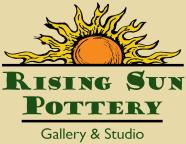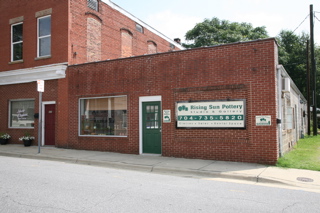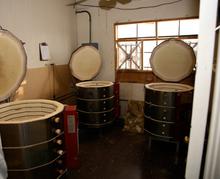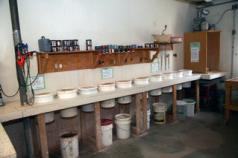About Us
Rising Sun Pottery is a
We are located in historic downtown Lincolnton, North
Carolina. Lincolnton is located in the foothills of the
Appalachian Mountains in the Catawba Valley Region of North Carolina, a place where pottery
turning has been an ongoing tradition for over 200 years. Today, there are over 60 potters
turning clay in Lincoln County alone.
students per class, students are insured of more personal attention and with
different skill levels in each class, each student will benefit from the different
levels of instruction given.
Our open-to-the-public studio offers a great work environment and is fully
equipped to serve both students and accomplished potters alike. The
spacious studio work space is well-ventilated with plenty of natural light
and shelf space. There are five potter's wheels, a slab roller, extruder and
other specialty equipment to make your studio experience as carefree as
possible. We have clay reclamation equipment including a pug mill, and
we reclaim or recycle everything. Our electric kilns are two Skutt
KS-1027's, one Skutt KM-1227, a small test kiln, plus a large raku kiln
capable of firing 15 pots per hour. We hope to have a small up draft kiln in
operation in the near future.
Also our on-site warehouse is full of clay and dry materials, ensuring
fast, prompt and low cost delivery of all your clay needs.
209 South Academy Street Lincolnton, North Carolina 28092
©2020 Rising Sun Pottery. All rights reserved.
• full-service, open-to-the-public pottery studio
• teaching facility
• clay co-op
• retail store
• service/repair center
• wholesale/retail clay and equipment dealer
Gary Lee became the owner of Rising Sun in December 1999. In June 2008, Rising Sun Pottery expanded into the building next door benefiting both the studio and students by creating more warehouse capacity to meet a growing demand for additional pottery classes.
Rising Sun students and potters make traditional and contemporary utilitarian stoneware as well as folk art clay creations. Their work is wheel-turned, hand-built, or a combination of both. Pots are fired Cone 6 in electric kilns with potters having access to gas and wood fired kilns.
Day and night classes are taught year round with most
students having five-eight years tenure. With only five




